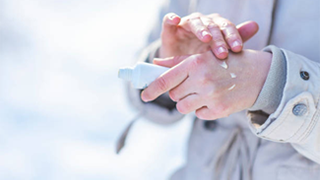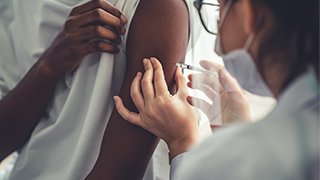Winter Tips from Health Services
Wednesday, January 24, 2024

Applying lotion is a good way to help protect you from Winter Itch
Winter conditions in NJ can be brutal, especially for our students not used to Northeast weather conditions. Common effects include acne, chapped lips and flare-ups of pre-existing conditions such as eczema, rosacea and psoriasis.
During the winter months we often find ourselves going back and forth between the warm and cold temperatures. The warmth of heaters indoors can dry skin and trigger flare-ups.
Acne is a condition we typically image happening when skin gets oily but, in the winter, when skin dries up pores can get clogged. This leads to a buildup of dead skin cells contributing to clogged pores and bacterial accumulation. Daily skin cleansers can be effective to minimize symptoms.
Psoriasis is an autoimmune condition that can be made worse in cold weather. You may notice red scaly patches and feel burning or tenderness in the skin. Joints may sometimes be affected.
Rosacea is another condition triggered by the cold. It causes the face to “blush” as blood vessels become more visible.
Chapped Lips are a common side effect of dry skin in the winter. The thin layer of skin dries out and is prone to splitting in cold weather. This can be easily prevented with moisturizing lip balm to hydrate the lips.
Winter Itch is another condition that is commonly seen resulting in red scaly rashes on the skin or small bumps. Symptoms resemble eczema but the difference is timing. Winter itch occurs only in the winter and is temporary. Anyone may experience it but it can be soothed by routine skin moisturization, avoidance of wool or other itchy material. If severe, your doctor may suggest a steroid cream.
Tips to minimize the impact of could weather on our skin:
- Use plenty of moisturizers or emollients on exposed areas before going outside.
- Dress warmly and avoid itchy material on the skin.
- Instead of one big jacket, wear several layers of cotton. This fabric is a smarter choice for people with skin conditions such as psoriasis because it breathes better.
- Take a cool shower to relieve skin symptoms.
- Hydrate with water to help keep the skin moisturized.





